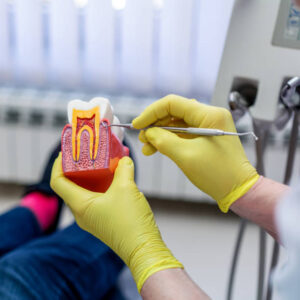Moreover, a dental crown is a “custom-shaped tooth-like” cover that is used to conceal big areas that cannot be rectified with simple fillings. It may also be placed if you have teeth that are improperly shaped, severely stained, discolored, or fractured.
The majority of patients who visit our office need dental crowns. Because it is both effective and affordable, it is one of the most often performed dental operations.
The visual attractiveness of your smile and your whole personality may be improved with the aid of dental crowns, which can also help you disguise undesirable aspects of your teeth. To put it another way, a dental crown is comparable to a tooth cap in that it functions as a straightforward and efficient option for restoring teeth that have been shattered or damaged.
Please take note of the following information about dental crowns.
What are the workings of dental crowns?
When your dentist gives you the go-ahead to receive a dental crown, the first thing he or she will do is take an x-ray of your teeth to set up an imprint of your teeth.
Based on this impression, a mold is created that assists in the creation of a temporary crown that is affixed to your broken tooth to give protection and cover the region while the permanent crown is being constructed.
Because it is manufactured in a dental laboratory, the preparation of a permanent crown might take up to four weeks.
Various Forms of Dental Crowns
Acrylic crowns are the most popular form of crowns; however, while they are the most frequent type of crowns, they are not the only choice that you have; there are numerous other varieties of dental crowns as well. The materials porcelain, metal alloy, ceramic, and gold alloy are also among the most often used materials.
Porcelain: The most significant advantage of porcelain crowns is that they may be crafted to seem like your actual teeth. Because porcelain is a somewhat fragile metal, it is fused with metal alloys to make it more robust. The price is not prohibitively expensive at all.
Ceramic: Ceramic crowns are comparable to porcelain crowns in terms of cost, but they are often lower in weight because they do not need the metal to be fused with them. Ceramic crowns are not as long-lasting as porcelain crowns, but they do offer the user a more natural sensation. However, they need more maintenance due of their fragility.
Metal and gold Alloys: Due to their longevity, metal alloys and gold alloys have been considered for use as dental crown materials for many years. Even though they are often more costly than other possibilities, they have been employed for this purpose. Furthermore, they do not seem as natural as other choices, and as a result, they are ideal for teeth that are not visible when you smile or open your mouth.
How unpleasant and potentially risky is the procedure?
A small amount of anesthetic is given to the patient before the procedure is carried out. This eliminates any possibility of the patient experiencing any pain or discomfort. It is possible that the patient would have some sensitivity or very mild discomfort once the anesthetic has worn off. This sensation will disappear within a few minutes or hours.
What is the average lifespan of a dental crown?
It has been estimated that dental crowns may endure anywhere from five to fifteen years, depending on how well they are maintained. To ensure that your dental crowns last as long as possible, you need to make sure that you take care of your oral health. This includes cleaning and flossing your teeth on a regular basis and avoiding biting on surfaces that are hard.
If you have any more questions about dental crowns or any other dental treatment, please do not hesitate to get in contact with us here at the NJ Dental Implant Center.





